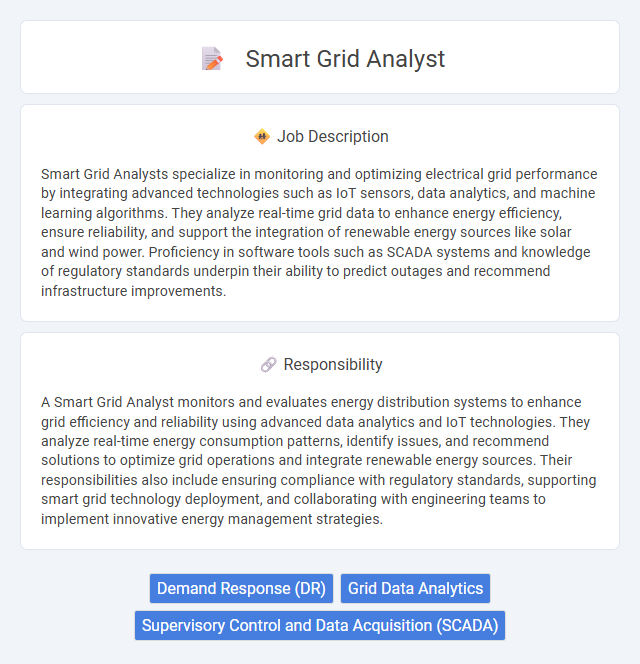
Smart Grid Analysts specialize in monitoring and optimizing electrical grid performance by integrating advanced technologies such as IoT sensors, data analytics, and machine learning algorithms. They analyze real-time grid data to enhance energy efficiency, ensure reliability, and support the integration of renewable energy sources like solar and wind power. Proficiency in software tools such as SCADA systems and knowledge of regulatory standards underpin their ability to predict outages and recommend infrastructure improvements.
Individuals with strong analytical skills and a passion for technology and energy systems are likely suitable for a Smart Grid Analyst role. Those comfortable working with big data, complex software, and interdisciplinary teams have a higher probability of thriving in this position. People who prefer routine tasks or lack interest in evolving energy technologies may find this job less fitting for their skills and interests.
Qualification
A Smart Grid Analyst must have a strong background in electrical engineering, data analytics, and energy management systems, often supported by a bachelor's or master's degree in related fields such as electrical engineering, computer science, or renewable energy. Proficiency in advanced software tools like SCADA, GIS, and data modeling platforms is essential for analyzing grid performance and optimizing energy distribution. Experience with regulatory standards, smart grid technologies, and the ability to interpret large datasets to improve grid reliability and efficiency greatly enhances qualification.
Responsibility
A Smart Grid Analyst monitors and evaluates energy distribution systems to enhance grid efficiency and reliability using advanced data analytics and IoT technologies. They analyze real-time energy consumption patterns, identify issues, and recommend solutions to optimize grid operations and integrate renewable energy sources. Their responsibilities also include ensuring compliance with regulatory standards, supporting smart grid technology deployment, and collaborating with engineering teams to implement innovative energy management strategies.
Benefit
Smart Grid Analyst roles likely offer significant benefits such as enhanced career growth opportunities and the ability to work at the forefront of energy technology innovation. Professionals in this field probably enjoy access to cutting-edge tools and data-driven decision-making processes that improve power grid efficiency and sustainability. There is a strong probability that the job also provides a sense of contributing to environmental goals and the development of smart infrastructure systems.
Challenge
Smart Grid Analyst roles likely involve complex data interpretation and integration of evolving technologies, posing significant analytical challenges. Professionals may frequently encounter difficulties in ensuring grid reliability and cybersecurity while optimizing energy distribution. Problem-solving skills are probably essential to navigate the uncertainties and rapid changes within smart grid systems.
Career Advancement
Smart Grid Analysts play a crucial role in optimizing energy distribution by analyzing data from smart grid systems to enhance efficiency and reliability. Career advancement opportunities include progressing to senior analyst roles, project management positions, or transitioning into energy policy and strategy development. Gaining expertise in data analytics, renewable energy technologies, and regulatory compliance significantly boosts prospects for leadership roles in utility companies and energy consultancies.
Key Terms
Demand Response (DR)
Smart Grid Analysts specializing in Demand Response (DR) utilize advanced data analytics and grid management technologies to optimize energy consumption patterns and reduce peak load stress. They analyze real-time consumption data and consumer behavior to develop strategies that incentivize reduced energy use during peak demand periods, enhancing grid reliability and efficiency. Expertise in DR program design, tariff structures, and regulatory compliance enables these analysts to support sustainable energy distribution and integration of renewable resources.
Grid Data Analytics
A Smart Grid Analyst specializing in Grid Data Analytics leverages advanced data modeling and machine learning techniques to interpret vast datasets generated by smart meters and grid sensors. Expertise in load forecasting, anomaly detection, and real-time energy consumption patterns enhances grid reliability and optimizes operational efficiency. Proficiency in tools like Python, SQL, and GIS, combined with knowledge of power systems and IoT integration, drives informed decision-making for sustainable energy management.
Supervisory Control and Data Acquisition (SCADA)
A Smart Grid Analyst specializing in Supervisory Control and Data Acquisition (SCADA) systems is responsible for monitoring, analyzing, and optimizing real-time data to ensure efficient grid operation and reliability. Expertise in SCADA software platforms, communication protocols, and grid automation tools allows the analyst to identify and resolve operational issues, prevent outages, and enhance grid resilience. Proficiency in integrating SCADA data with advanced analytics supports informed decision-making for demand response, load balancing, and renewable energy integration.
 kuljobs.com
kuljobs.com